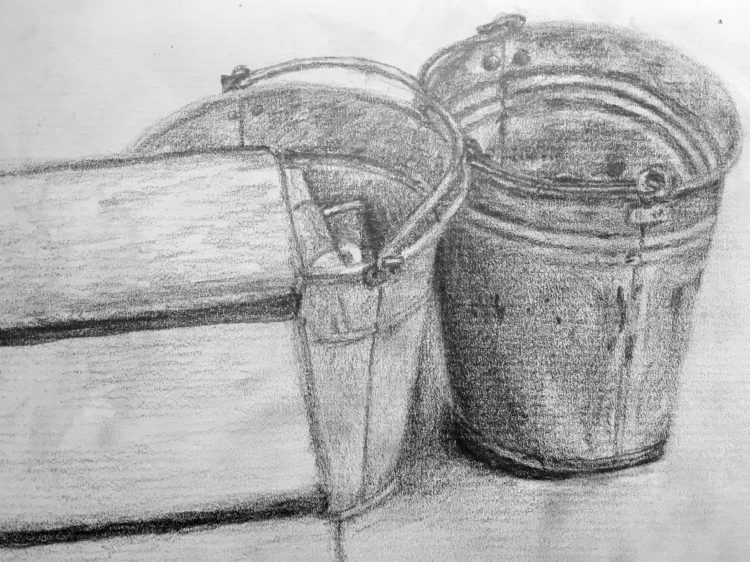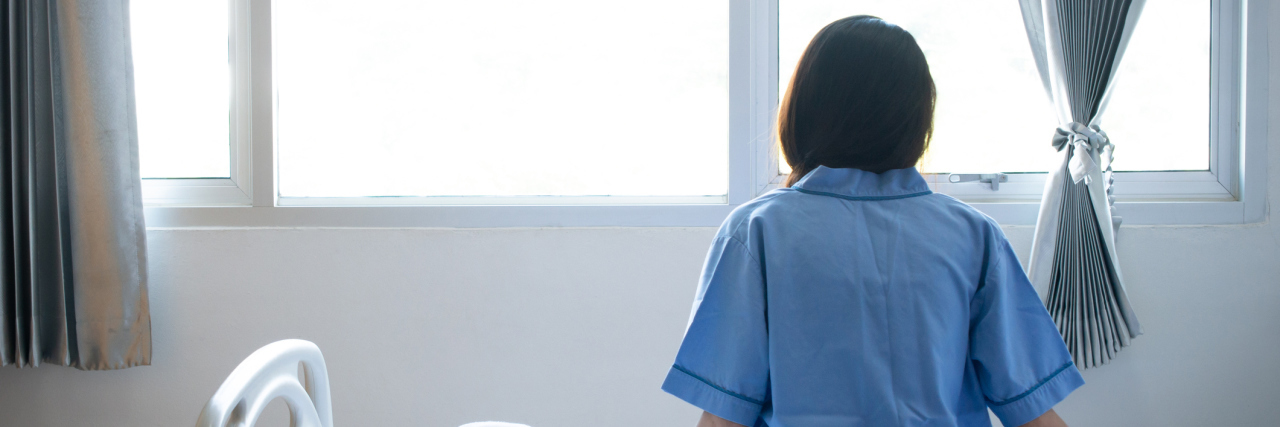Hollywood uses mental hospitals as a backdrop for horror films, a weird hybrid of prison, zoo and science lab.
Truth is, they’re much more conducive to healing than horror — it’s almost as if they exist for the same purpose as any other normal hospital.
This is a story of three weeks in my life one June, spent inside a psychiatric hospital in the U.K.
On my first morning in mental hospital, I spent three hours staring at and drawing two grey buckets. There is not a lot to look at in a mental hospital.

Then I walked in circles around the tiny courtyard 50 or 100 times for exercise. There are not many places to go in a mental hospital.
Despite appearances, this was not an effort to prove to other patients that I had earned my place as one of them (although I imagine it didn’t make me look any saner). In fact, I felt calmer and more put together than I had for nearly a year. The sky was brightly, uncompromisingly, positively blue, and I felt like everything around me was moving a few frames slower than normal life. I had time to take in my surroundings, instead of feeling like they were rushing away from under my feet.
Finally away from the pressures of studies, social life, heartbreak and the concerned faces of loving friends and family, I finally had some space of my own. I cannot describe the immensity of the relief to have literally nothing to focus on but rest and recovery.
Until now, any attempt I’d made at recovery was for other people — living at home with my parents, they were constantly pushing me to work on my CBT (cognitive behavioral therapy), get outside, be OK. Obviously, they had good intentions, but the problem was that I didn’t. If it were up to me, I’d stay in bed all day, without resisting my mind’s awful thoughts, allowing depression to convince me that they were true. So to stop my parents from worrying, I’d fake it. Even with my therapist, I was too embarrassed to reveal how far into the pit my mind had fallen. It felt so tiring to pretend I was making progress, only motivated by the (imagined) pressure of people expecting me to be making progress, and the gulf between what I was really feeling and what I was allowing others to see was growing larger and larger. I always felt that I was only getting better (or trying to) for other people; I myself didn’t really care what happened to me. It makes me so sad to remember myself feeling that way.
But such a gulf isn’t sustainable; a breaking point was inevitable. This post isn’t about that breaking point; it is about the time afterwards, when my internal reality and my outward appearances could finally reunite and I could focus on what I truly wanted, and the thing I truly wanted could be recovery.
And by focus, I don’t mean more pressure to reach some end goal of recovery. I mean being in a place where I could be honestly unwell, where I had the time and autonomy to slow down life as much as to the pace of thinking “OK, I’m outside now. I’m going to put one foot in front of the other. I can see my pink trainer taking a step. I’m going to do that again” — and letting each word of each thought pass purposefully through my mind. This was mindfulness to the max.
Speaking of autonomy, it’s strange to think how freeing being in hospital was, given how closely we were looked after. All my belongings were searched on arrival, and any posing the slightest risk were taken away, e.g. my laptop cable. One man’s shoes kept slipping off because he wasn’t allowed his shoe laces. For the first few days, a nurse checked on me every 15 minutes, 24 hours a day. Then it was reduced to every half hour, then hour. It sounds suffocating, and in normal life it probably would be, but given how I was then, it was liberating. I knew I was always safe — I couldn’t hurt myself, so I didn’t have to worry.
In fact, it became almost like a little game to me, noticing all the ways in which I was safe. My room didn’t lock, and to get outside into the courtyard or *beyond* (to the exotic reaches of the therapy rooms or canteen), a staff member had to buzz the door open and take me out. The doors didn’t even have handles, just a curve of metal to pull. The mirror was made of plastic, not glass that could shatter. The windows only opened 5 cm wide. No shower curtain, no pins in the noticeboard, no coat hooks… bliss.
Not that we were just sitting around being rolled in bubble wrap all day. All that energy not expended on self-destructive behavior or worrying about the likelihood of such behavior was instead spent on therapy. It was intense and exhausting. Six hours of group therapy on Monday for depression, and again on Friday for anxiety. Two one hour one-to-one therapy sessions a week and several consultant appointments. Sprinkle in a few more two hour group sessions for good measure — on emotions, stress, sleep, etc. I’d never stuck to CBT before, but now that I had structured sessions with no other work to prioritize, and peers working on the same material, I finally gave therapy the attention and effort it deserves and requires, and surprise surprise — it worked.
When we weren’t in therapy, there was “occupational therapy,” which is basically any simple activity to keep you… occupied. It was all trivial stuff — smoothie making, arts and crafts, yoga. But there was something so lovely about being around other adults pressing pause on their busy lives of serious jobs and hectic families to spend an hour sticking feathers and glitter onto a piece of colored card and being content with that.
As I said, the other patients helped my recovery so much. I’m more social anxiety than social butterfly, so I wasn’t really up for slapping on a grin and holding out a handshake when I first arrived. But within a few minutes of sitting in the communal area, another patient approached me and started chatting. I was struck by how refreshing it was to talk to people who’d gone through the same but totally different experiences. To joke about being depressed without being cruel, or on the other extreme, without being met by an awkward laugh and sympathetic eyebrow furrow. And what was miraculous was that by the second and third week, I found myself being the friendly face to nervous newcomers. Me, a girl who doesn’t even like calling up to book the dentist. But that’s just how it was in hospital. We helped each other.
I was fortunate that the hospital was very near home, so my family visited every day, as did an amazing number of my friends. I was shocked and so touched as to how keen people were to visit, friends who obviously cared so much but who, in my sick state, I thought barely even remembered me. I can’t tell those friends who visited me or sent cards or texts how much it meant to me, then and still now.
I am lucky to have people like that in my life. I am lucky that the hospital I went to was so nice, professional, safe, comfortable. I know lots of people are not so lucky.
I think back on those three weeks, which were quite a time ago now, and I remember it as such a distinctive bright window of stillness and calm in my life, a huge turning point in my recovery — pivotal but not overwhelming. Of course, there were difficult days — days I couldn’t get out of bed and was told off for missing therapy, days where the social circle of inpatients seemed claustrophobically small, and nights where I wrapped myself tight in my duvet to hide from the sounds of patients screaming and sobbing in the corridor. I was definitely keen (albeit nervous) to go home by the third week. But it will always be such a special time to me.
And to past me, sitting teary and nervous in bed the night before going into hospital — I know the only reason you’re not running away out of fear is that you’re too much in a daze to register fully what’s going on. But you’re about to discover a very rare and special thing, and you’re going to discover how much you needed it — life’s pause button. You will use it well, and you will be OK.
Follow this journey on quiet person, loud thoughts.
Getty image via Boyloso

